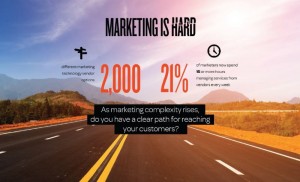Coming up with original or catchy wording for your social posts is important if you want to stand out in the busy social media sphere. To help you avoid common clichés, we’ve put together a list of words to avoid using, (some of which can actually repel customers), and potential replacements.
1. Groundbreaking
Unless you invented the smartphone or something truly groundbreaking, you should refrain from using this word.
- Good alternative: Swap out groundbreaking with “innovative” or “new to our industry.”
2. Once in a lifetime
Unless you’re pulling an Oprah and giving away cars, it’s doubtful that your customer will never again have a similar opportunity.
- Good alternative: You can say “rare opportunity,” or use a deadline or restriction. For example, “Only 17 concert tickets left!”
3. Best
This is one of the most generic terms out there, so it’s a good idea to find an alternative.
- Good alternatives: Use “our top seller,” “most-referred,” or “customer favorite.”
4. Check this out!
When you want to draw attention to something, this statement seems like the perfect fit, but it’s overused and doesn’t say anything engaging to draw your readers in.
- Good alternative: Write a short description of the article to tease it and include a link. Your audience will do the rest.
5. Think outside the box
It’s another all-too-common phrase, so resist the urge to use it.
- Good alternative: Describe how you’re different. The experts at specialty floral design company Flou(-e)r use descriptive posts to do just that. Rather than saying, “Here are a few out-of-the-box decorating ideas” the shop gets more specific by saying, “Check out our new ornate mercury glass candle pedestals with wax luminaries on top.” It’s more descriptive and gets the point across.
6. Game changer
Unless you can back up your mega-hype with something that will have other people calling it a game changer, you’ll want to swap out this phrase.
- Good alternative: You could use words like “beneficial” or a phrase like “a new approach.”
7. World-class
Step out of the ‘90s and drop the world-class phrase.
- Good alternative: Use statistics to show how amazing your company, product or service is. For example, Shirazi Law Group tweeted about getting a 9.9 out of 10 average rating from its clients.
8. LOL
We get it. It’s short, which makes it perfect for social media. This acronym for “Laugh Out Loud” is often used to indicate jest when a nonverbal statement might otherwise be taken seriously.
- Good alternative: Don’t say anything at all. If you’ve made a funny comment, or posted something amusing, let your readers decide so, and allow them to reply with their revelations of laughter.
9. YOLO
If “You Only Live Once,” you’ll still see this acronym 6 million times before you die. We know it’s popular, but try using something more descriptive about what you have to offer.
- Good alternative: Try other words that create a sense of urgency. You could use phrases like “This deal expires in 24 hours” or “Limited time offer.”
10. Selfie
It’s a term that plagues social media. We’re not against the act of taking a “selfie” (okay, sometimes we are), but there are better ways to ask your customers to participate.
- Good alternative: Go old school with “photo” or “image.” If you’re asking customers to share a photo, describe what you want without using the word “selfie.” For example, “show us how you use our product.”
11. Bae or Bruh
The slang terms stand for “babe” or “brother,” and they’re commonly used phrases on social amongst a younger crowd. Just because they’re saying it doesn’t mean you should. Otherwise, it seems like an overly eager attempt to relate. Twitter profiles have been created specifically for shaming brands who use the words in their social and marketing efforts.
- Good alternative: Using the word “friend(s)” or simply typing someone’s specific name is usually better if you want to make things more personal.
Overall, the best takeaway is to replace overused terms in your social media marketing with more specific and descriptive words. While they may work from some brands, you’re more likely to earn your customers’ interest, trust and business if you’re original.
(262)
Report Post




